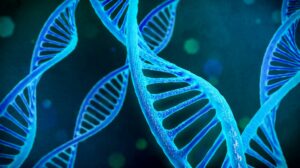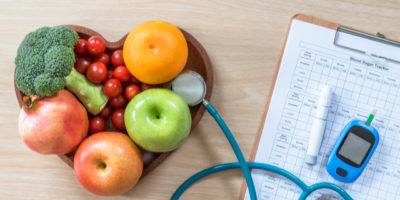Looking for permanent weight loss? Top dietitian says answer lies in your DNA
Could the secret to lasting weight loss lie in your DNA? Registered Dietitian Rachel Clarkson, reveals how a DNA test can tell us exactly what we should and shouldn’t be eating in order to look and feel our best
Imagine if someone told you the exact diet you needed to be on in order to be the healthiest version of yourself – would you stick to it?
London’s leading Dietitian in Personalised Nutrition, Rachel Clarkson aka The DNA Dietitian, has partnered with Nutrigenomix – an award winning DNA testing company at The University of Toronto.
The DNA Dietitian has helped hundreds of clients become the healthiest version of themselves by providing them with 100 per cent personalised diet and fitness recommendations formulated specifically for their DNA.
Her proven method – ‘Eating The DNA Way’ – ensures you understand exactly why and what you need to eat to be your healthiest self.

A healthy, balanced diet does usually provide enough energy and nutrients to support optimal health, reduce our risk of disease and maintain a healthy body weight.
However, while it is wise to follow generalised dietary recommendations, the ‘one-size-fits-all’ approach to nutritional advice could limit some individuals from reaching their full potential where diet and fitness is concerned.
Nutrigenomic testing identifies why individuals respond differently to the same foods
Permanent weight loss, optimum digestion, more energy and longevity are just some of the benefits you can expect when delving into your genetic data and making specific dietary changes with The DNA Dietitian.
Our genes alter our dietary preferences (smell, taste, appetite), and the amount of nutrients we get from the food we eat (digestion, absorption, and metabolism). Nutrigenomic testing identifies why individuals respond differently to the same food, drinks and supplements we consume.

What does the DNA test show?
Developed by world renowned researchers in the field of Nutrigenomics and Personalised nutrition, including Harvard trained professor Ahmed El-Sohemy, the DNA test has recently been featured in The British Medical Journal.
‘Our genetic test is a once in a lifetime investment in yourself to provide you with information about variations in your genes that modify your individual response to nutrients. Think of it as your body’s road map to identifying the foods that you require more or less of to be the healthiest version of yourself,’ explains Clarkson.
‘Genetic variations determine not only our appearance, such as hair, eye and skin colour, but also how we metabolise nutrients from foods, beverages and supplements’.
For example, if you and a work colleague were to eat the same lunch (eg. a chicken salad) and were to follow up with a blood test, there would be great discrepancies in nutrients levels between you and your colleague, due to the way your DNA causes you to metabolise food.
The best diet for your body depends on your specific genetic variations
‘When testing your DNA, we look at your ability to metabolise different nutrients and vitamins, including vitamin A, D, C, E, B12, folate, iron, calcium, zinc, magnesium and more,’ says Clarkson.
Nutrition is one of the most important lifestyle factors affecting your risk for developing certain diseases and has a significant impact on overall well-being.
‘Eating The DNA Way with bespoke dietary recommendations ensures ‘nutrition is working for us’ to prevent disease, manage our weight, live longer and improve digestion,’ adds Clarkson.
‘Some individuals may benefit from limiting their consumption of caffeine to prevent a heart attack or increasing their intake of omega-3 fat to reduce inflammation. Others may benefit from doing less exercise or eating more protein to lose weight.
‘The best diet for your body depends on your specific genetic variations. So, understanding your genetic profile and its implications on your unique response to foods, in addition to an expert consultation full of advice you will have the ultimate knowledge you need to make the best dietary choices for your health and wellbeing’.
https://www.instagram.com/p/CUIZOGFou3s/
What does the test involve?
When Rachel offered me the chance to start ‘Eating The DNA Way’, I couldn’t wait for the DNA test kit to arrive by post.
What secrets and insights would my DNA reveal?
Collecting a saliva sample (by spitting into a tube), couldn’t have been easier and all I had to do was send it back in the sterile packaging supplied with its pre-paid postage.
Once you’ve posted your test, DNA analysis will be carried out at a secure laboratory at the University of Toronto with your personal information kept separately with Rachel and her team.
(Your DNA and results are never shared with a third party and can be destroyed after testing if you prefer).

A few weeks later, after filling out a Health & Nutrition Questionnaire you’ll receive your genetic results and have an in-depth consultation, that’s explained in an easy-to-understand format.
Scientific research concludes that meaningful diet and lifestyle changes are only seen when DNA results are translated by an expert and are combined with actionable goals.
Rachel’s proven method ‘The DNA Way’ incorporates both of these important factors, that lead to greater results than a standard DNA test that you order online.
After talking through my results with Rachel, I was blown away by the in-depth details my DNA had to show about how to improve my health.
Here are some key questions the DNA test revealed the answers to about how to stay fit and healthy…
#1 How do I calculate my calorie requirements for weight loss?
It’s no secret that some people gain weight more easily than others and we all want to know how we can keep the weight off for good.
A calorie is a unit of measurement used to quantify energy, which comes from the foods and beverages we consume.
Energy is used to fuel all functions and processes in the body such as digestion, breathing, brain function and maintaining a normal body temperature – this is known as your Resting/Basal Metabolic Rate (RMR/BMR), which varies between individuals, based on differences in height, weight, age and gender.
The total amount of energy you use in a single day is your RMR/BMR, plus the energy that is used for physical activity such as daily tasks and exercising and energy used to breakdown your food – all together, is known as your Total Daily Energy Expenditure (TDEE).
Maybe your calorie deficit is too large and actually slowing down your metabolism
Ultimately, fat loss occurs due to a calorie deficit. This means consuming less calories than you burn off (use for energy). Consuming less energy (calories) OR expending more energy (exercise) will lead to weight/fat loss.
‘Research shows certain variations of the UCP1 gene can tell us if you have a ‘slow metabolism’ or a low resting metabolic rate. These insights can help determine your optimal calorie requirements for weight loss’, explains Clarkson.
‘Maybe your calorie deficit is too large and actually slowing down your metabolism or maybe you need to increase your calorie deficit to get better results – we won’t know until you take the test’.
Interestingly my DNA results highlighted that I did have the genetic variation that causes me to have a low RMR/BMR aka a ‘slow metabolism’.
Because of this, I now understand that I need to consume less energy (calories) to maintain or lose weight than other people who may not have that genetic variant.
https://www.instagram.com/p/CMu7LhlLtqH/
#2 Do I need a high protein diet to lose weight?
High protein diets are all the rage these days with people downing protein shakes like they’re going out of fashion.
Protein is an essential nutrient for muscle building and repair, healthy hair, skin and nails, wound healing and immune function.
Due to its positive effect on muscle building, a high protein diet is considered ideal for those who are trying to build their strength. Not only that, but protein is also popular due to its ability to regulate appetite by keeping you full and satiated after meals.
But it turns out, only one in six people actually experience enhanced weight loss results when consuming a high protein diet.
My DNA results showed that I wouldn’t benefit from a high protein diet
‘Clients often come to me confused that they’re not losing weight on a high protein diet. When we receive their DNA results that shed light on their FTO gene variation it starts to make sense,’ says Clarkson.
The FTO gene, also known as the ‘fat mass and obesity-associated gene’ impacts weight and body composition and is related to our metabolism, energy expenditure and energy balance.
‘Research shows that those with the AA variation of the FTO gene lose 220 per cent more body weight from a diet higher in fat, when consuming a high protein diet versus a lower protein diet,’ Clarkson reveals.
‘Those with the other variations of the gene don’t have any enhanced weight loss results on a high protein diet and actually too much protein can hinder weight loss results – acting as more calories, reducing your deficit’.
My DNA results showed that I wouldn’t benefit from a high protein diet and therefore if I want to lose or maintain my weight, I need to consider smaller protein portions instead.

#3 How do I find out my food intolerances?
Plenty of us are familiar with the terms ‘lactose intolerance’ and ‘gluten intolerance’. Well these intolerance’s can be explained by genetic variations found in your DNA test results.
‘Maybe you’re bloated, suffer with tummy discomfort or have trouble with your stools? Our DNA test and expert advice will help you identify intolerances that may be the culprits so you can have a happy gut’, explains Clarkson.
‘Many companies offer food intolerance tests, but these aren’t based on scientific evidence and are a money-making tool.
intolerance’s can be explained by genetic variations found in your DNA
‘The British Dietetic Association (BDA) advises the public to strongly avoid the following tests: IgG blood test (the only reliable blood test is an IgE test, which is carried out by doctors to diagnose food allergies not intolerances), kinesiology, hair analysis, leucocytotoxic or cytotoxic test, pulse test or electrodermal (Vega) test’.
#4 How much coffee should I drink?
Caffeine is the most widely consumed stimulant in the world. Coffee, tea, fizzy drinks and chocolate are popular sources of caffeine that contribute to our overall intake.
‘General dietary guidelines recommend that 400mg (milligrams) a day is safe to consume daily, which is around four espresso shots or two medium coffees bought in a cafe (1 espresso is 100mg, and a tea is 50mg),’ says Clarkson.
According to the media, one minute coffee is good for your heart and another minute coffee is bad news.
Fast metabolisers benefit from drinking between 200-400mg of caffeine per day
Clarkson simply explains that ‘discrepancies in the findings are seen due to the genetics of the population being studied.
‘Actually, when you look closely, individuals with certain variations of the CYP1A2 gene don’t produce a lot of the enzyme that breaks caffeine down – making them slow metabolisers of caffeine,’ Clarkson adds.
‘In fact, 50 per cent of the population are slow metabolisers, and consuming the apparent ‘safe’ guidelines for caffeine at 400mg per day would actually double the risk of a heart attack.
‘We know this after a number of high quality studies have been published in this area which have shown that the effect of coffee on cardiovascular health depends on the variation of the CYP1A2 gene’.
If you’re thinking about reducing your caffeine intake after reading this, don’t put your coffee down too soon – if you’re a fast metaboliser (i.e you break caffeine down very well), it could actually be good for you.
‘Fast metabolisers benefit from drinking between 200-400mg of caffeine per day as the research suggests that it seems to have a cardioprotective effect!’ Clarkson asserts.

#5 How much exercise do I need to do to lose weight?
Physical activity and exercise is imperative when it comes to staying healthy. Not only is it important for physical fitness, but also for the prevention of diseases as well as mental health.
Cardiovascular (cardio) exercise, including fast walking, running, swimming and cycling helps to elevate heart rate which is known to improve heat and lung function.
Strength training exercises such as weightlifting, yoga and Pilates helps to improve muscle strength as well as bone health.
Another main reason people choose to exercise, is to manage or lose weight. Both cardiovascular exercise and strength training can help people achieve weight and fat loss, however some people are able to achieve greater weight loss results depending on the type and amount of exercise they do.
‘Only three in ten people burn fat efficiently for fuel when they exercise and experience enhanced weight loss results from higher levels of exercise,’ reveals Clarkson.
‘Of course, it’s still important to stay active on a daily basis, but working out super hard at the gym every single day isn’t beneficial for the majority of people’.
The ideal type and amount of exercise someone should be doing for optimal health can be determined by our genes.
Only three out of ten people burn fat very efficiently for fuel when they exercise
‘People often come to me listing off a whole heap of weekly exercise they do to try and burn fat, from spin class to personal training,’ says Clarkson.
‘Whilst this is healthy for their heart, their DNA results often highlight that their bodies are more likely to burn stored carbohydrates (glycogen) than fat’.
Indeed, a large study of obese, sedentary individuals found that a variation in the ADRB2 gene predicted fat loss in response to cardiovascular exercise.
This was confirmed in another study that found that women who had a variation of the ADRB2 gene had an enhanced response to a cardiovascular exercise program, losing over three times more body fat than women who didn’t have this gene and participated in the same exercise program.
Rachel explained that my DNA results suggest that I wouldn’t have enhanced weight loss results with higher levels of physical activity and therefore more emphasis and attention needs to be paid to my diet rather than exercise if I want to lose weight.

#6 Why do I like the taste of fatty foods the most?
The amount of food we eat is largely influenced by the taste we have for food and our food preferences. Some of us have a sweet tooth, others prefer savoury options.
One particular food preference we need to be paying more attention to is our eating behaviour around fatty foods. The way we perceive the taste of fatty foods is particularly important due to the fact that our intake of fats is what affects our cardiovascular health and our fat mass.
Fat is a necessary macronutrient, as it’s needed in order to absorb key vitamins (A, D, E and K). Fat though, is more calorific at nine calories per gram compared to just four calories per gram of protein or carbohydrates.
This means that if you over consume fatty foods, you are more likely to gain weight and have an unhealthy body fat percentage.
Research has shown that our preference for fatty foods can vary depending on which version of the CD36 gene we have.
The CD36 gene is found on the surfaces of many cells, including taste bud cells in the tongue, and is involved in the transport of fat from the blood.
our preference for fatty foods can vary depending on which version of the CD36 gene we have
Several studies have linked variations in the CD36 gene to differences in the perception of the taste and texture of fats and oils.
‘Super tasters tend to be able to detect the taste of fats and oils at lower levels than low tasters,’ says Clarkson.
Certain variations of the CD36 gene, mean you are a ‘super taster’ of fats. This means that you will be better able to sense the taste of fats at lower levels.
In comparison, ‘low tasters’ need higher levels of fats in their foods to achieve the same fatty taste. This often leads to consuming too much fat, and the wrong types of fats (saturated vs. unsaturated), which in turn can increase your risk of obesity and cardiometabolic disease.













